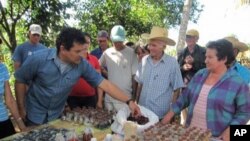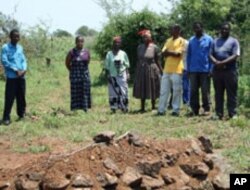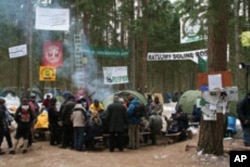Every April, during the week-long observances surrounding Earth Day, grassroots environmental activists from six regions of the world are honored with the Goldman Environmental Prize.
The privately-funded, $150,000 awards, based in the United States, recognize individuals who've shown courage and initiative in responding to environmental problems.
Farmer-led biodiversity projects
Agronomist Humberto Rios Labrada, with the Cuban National Institute of Agriculture, has played a major role in changing agrarian practices in Cuba.
Like farming systems in many countries during the last half of the 20th century, Cuban agriculture had adopted a chemical-intensive, highly mechanized, mono-culture approach - big, single-crop fields. As scientists eventually learned, this posed a threat to the island nation's biodiversity and over time, reduced crop yields - putting Cuba's food security at risk, as well.
Goldman laureate Rios says his plan was to address these urgent problems one farmer at a time. "I truly believe that if farmers are the ones making innovative decisions, Cuba can overcome its food challenges."
In the late 1990s, Rios and a team of young scientists created agro-diversity learning centers for farmers. They also helped establish seed farms across Cuba to promote cultivation of a wider variety of food crops. Food production increased dramatically.
Rios says the program that began with 25 people has expanded to include 50,000 farmers nationwide. "My dream is that one day all scientific research institutions will make seed diversity accessible and will recognize rural farmers' knowledge. And that Cuba will definitely become an organic agricultural island." Rios' ideas have also taken root in Mexico where he is engaged in similar farmer-led biodiversity projects.
Defending native peoples
Environmental lawyer Thuli Makama is the Goldman laureate from the African continent.
She has defended the right of native peoples in the southern African nation of Swaziland to live near private game reserves. Makama says these people have subsisted off the land for generations.
"While we do not condone poaching, it needs to be seen in context. More than 69 percent of the population of Swaziland is living below the poverty level. When one gets up in the morning and they don't have any money in their pockets, they look to the environment to give them their meal for the day."
A 1997 law gave game rangers in Swaziland the right to use armed force against suspected poachers. Makama says the rangers have shot and killed more than 100 native people in the reserve who were illegally hunting for game.
"When you say to me you are killing poachers but you are actually killing people who are poor neighboring the park who are going in there to find things to survive on, I think that does not solve the problem. The lasting solution would be balancing the interests of the local communities and those of the parks."
In 2009, after a five-year lawsuit, Makama won a landmark case. A state court ruled that the Swaziland Environment Authority must give non-governmental conservation groups, like the one she runs, a seat on its board and a voice in decision-making.
"What is key about being able to influence the decisions that are being made in that board is that it is the highest decision-making body on environmental management in the country, and we want communities to have space in the management and the benefit-sharing over natural resources," says Makama.
Balancing Nature and human needs
The complex balance between nature and human needs is also an issue in Poland's Rospuda Valley, which winds through vast tracks of primeval forest, peat bogs and wetlands.
It is one of Europe's last undisturbed wild areas. Goldman Prize winner Malgorzata Gorska has led the fight to stop a controversial highway project from cutting a swath through the wilderness.
"The Polish government had already approved the highway so we were afraid we might not succeed," says Gorska. "However, we felt strongly that we had to try because the place was so unique and so vulnerable and because we felt that we were right."
Gorska is a conservationist with the Polish Society for the Protection of Birds. She took the case to the European Commission with hopes that Poland would be held in violation of the European Union's regulations on protected sites.
"When we heard that we'd won the case in European court, we were extremely happy because this meant that laws pertaining to nature were now considered to be as important as any other issues," she says. "It wasn't a private victory. It was a victory for everyone, not just environmental organizations, but for common citizens that simply love nature."
Other Goldman laureates this year were honored for their efforts to protect Asian elephants in Cambodia, to expose pollution from factory farms in the United States and to campaign for a ban on the international trade in shark fins.
One hundred and thirty-nine people from 79 countries have received the Goldman Environmental Prize since it was established in 1989.






